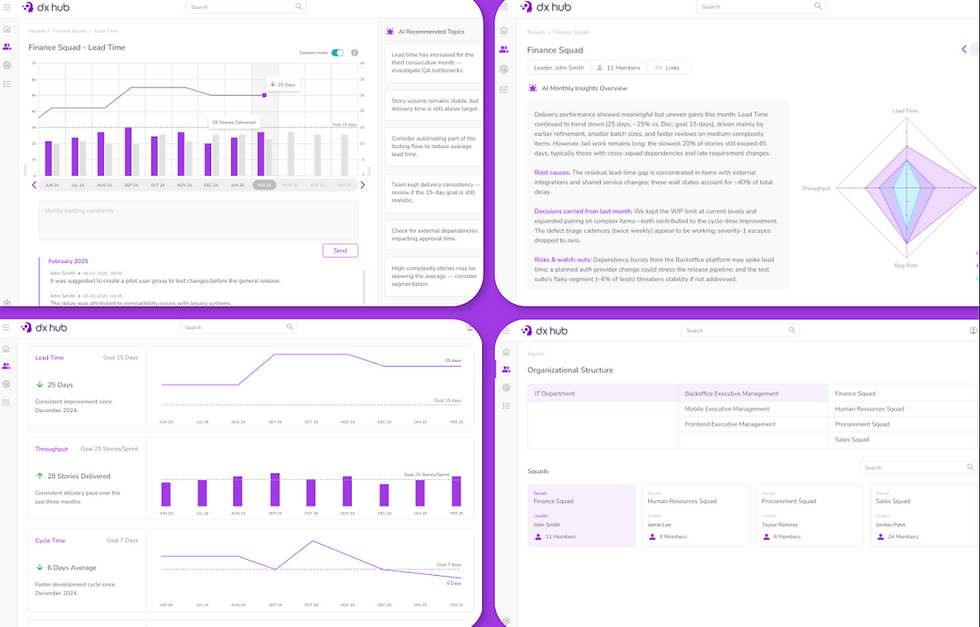Exploring Software Engineering and Developer Experience with B3 and Avalia Systems on the B3 Tech Cast
- Avalia

- Nov 4, 2024
- 3 min read
In this insightful episode of B3's Tech Cast, Verônica Pelinson, Technology Governance and Innovation Manager at B3, interviews Thiago Suzano, B3’s Director of Software Engineering, and Anderson Soffa, Avalia Systems' Technical Director in Brazil. They dive into the vital role software engineering plays in modern technology and how it's a driving force behind digital transformation.
The original discussion is in Portuguese, and we’ll provide a link for those interested. This article provides a summary of the main points in English.
Software Engineering: The Backbone of Modern Innovation
Thiago Suzano opened with insights into the foundations of software engineering. Traditionally, tech departments were focused on data processing rather than creating end-to-end solutions. But today, software engineering is pivotal not only in crafting the technology itself but also in shaping the overall user experience. He described the journey from simple data handling to complex system integrations, emphasizing the skills and collaborative nature of modern software engineers who build products that are widely used by clients and end-users.

The Importance of Developer Experience (DevEx)
Anderson Soffa brought attention to the importance of developer experience, a concept Avalia Systems champions as well. He explained that as software development becomes more sophisticated, creating a seamless environment for developers is crucial. From early days when software was built on basic text editors to today’s integrated development environments (IDEs) enhanced with artificial intelligence tools, the focus has shifted to making developers’ workflows more efficient.

Automation and Cloud-Based Infrastructure
As software products increasingly rely on cloud technology, automation of infrastructure has become a necessity. Soffa highlighted how practices like “infrastructure as code” allow developers to manage server configurations and security setups automatically. This automation ensures consistency and reduces the potential for human error, which is particularly valuable when products must be available across a variety of platforms and devices.

Building a Culture that Supports DevEx
Changing a company’s culture to support developer experience can be challenging, but both experts emphasized its importance. Thiago explained that at B3, creating an open and collaborative workspace is essential to boosting productivity and innovation. Teams work in open spaces to enhance cross-functional collaboration and share insights quickly. This setup, along with agile methodologies, helps developers stay connected to the products they’re building and fosters a sense of ownership and pride in their work.
Soffa pointed out that cultivating a strong developer experience also improves talent retention. In a competitive field, developers seek environments that allow them to focus on what they enjoy—problem-solving and creating impactful products—without unnecessary bureaucratic hurdles.

Investing in Future Talent
The conversation also addressed the ongoing shortage of skilled developers in Brazil and globally. B3 and Avalia Systems both invest in training and mentoring to bridge this gap, helping new engineers adopt the latest tools and practices. Soffa highlighted that Brazilian engineers are highly skilled and adaptable, with a depth of expertise that ranks among the best globally. Both companies are committed to nurturing this talent pool to meet the growing demand for high-quality software engineers.
The Future of Developer Experience and Software Engineering
Looking forward, both B3 and Avalia Systems plan to continue investing in modernizing legacy systems and developing new platforms. By embracing emerging tools, enhancing automated processes, and promoting agile methodologies, they aim to stay at the forefront of innovation in their respective industries.
Thiago concluded by expressing optimism about the future, underscoring the importance of empowering engineers to take ownership of products that align closely with business needs. This alignment ultimately leads to higher quality products, faster response to market demands, and, crucially, greater satisfaction for the developers themselves.


